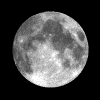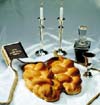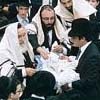"In the days of Matityahu, ... when the wicked Greek kingdom rose up against them to cause them to forget Your Torah and to cause them to abandon Your commandments ... "
Thus we begin the special prayer of thanks we add to our regular prayers on Chanukah. We allude to the spiritual danger which faced our ancestors during the reign of Antiochus the powerful Hellenist tyrant and thank Hashem for granting victory to "the few against the many and the weak against the strong."
How did these Hellenists attempt to subvert the Jewish People and influence them to accept their pagan beliefs?
They did so, our Talmudic Sages tell us, by decreeing that any Jew practicing one of three commandments would be put to death. These three commandments were Chodesh (the sanctification of the month upon sighting of the new moon), Shabbat (the observance of the Sabbath) and Milah (circumcision).
What is the common denominator of these three mitzvot which defines both the essence of the Hellenist threat and the significance of our salvation which Chanukah celebrates?
Human slavery takes many forms. In its most literal sense slavery refers to economic servitude to an exploiting master. But a man can be a slave to time, to creativity and to passion. While literal slavery is virtually a thing of the past, these extended forms of slavery have always been - and still are - very much a part of the human condition. It was Hashem's special gift to His beloved people to provide them with three mitzvot that would liberate them from such enslavement.
 | Chodesh - The very first mitzvah commanded to the Jewish People - while still in Egypt and even before Sinai - was quot;This Chodesh (month) shall be yours as the first of months (Shmot 12:2). This was a directive to the Sanhedrin - the Torah leadership of the nation - to determine the calendar of the celebration of all holidays and festivals based on their astronomic calculations and the testimony of witnesses who had sighted the new moon. The word chodesh for a month in the Hebrew lunar calendar is spelled with the same letters as the word chadash (new). This is in stark contrast to the word shanah used for year in the solar calendar of other nations whose months are artificial units unrelated to the cycle of heavenly bodies. The word shanah corresponds to yashan (old).
"Chadash shall be yours" says the Creator to His people on the threshold of liberation from physical enslavement. You will be liberated as well from the enslavement of time, for you will be given the power to determine the time of your sacred season, free from the immutable pattern of a solar calendar. You will be a dynamic people capable of casting off the habitual chains of old behavior in order to discover new energy for self-improvement. |
|
 | Shabbat - This too was something Jews began to observe in some form before they were commanded to do so, even while still in Egyptian bondage. The spirit of this sacred day of rest is liberation from man's passion for creativity. When the first man was created, his Creator commissioned him to "conquer the world," i.e., to fill the world with his progeny and harness all of nature to serve them. Creativity and conquest can, however, lead to overkill, with the created man gaining the illusion that he is the creator. The halt to creative effort that is mandated by Shabbat is the liberator from this enslavement to creativity and conquest. |
|
 | Milah - First commanded to Avraham, the father of the Jewish Nation, the mitzvah of circumcising male children is the key to liberation from physical passion. Before he circumcised himself his name was Avram, whose letters have a gimatriya (mathematical value of Hebrew letters) of 243. Afterwards he is Avraham whose gimatriya is 248. Our Sages explain that there are 248 organs and limbs in the human body. Before circumcision, our Patriarch had complete control over 243 of them but lacked such power over his two eyes, two ears and his reproductive organ. After circumcision he achieved the goal that his Creator had set for him - "to be complete." He achieved for himself, and for all his descendants who would follow his example, liberation from the physical passions stimulated by what they see and hear. |
The Greeks were the original champions of democracy and its message of political freedom. But, paradoxically, their Hellenist culture was founded on enslavement to time, to creativity and to passion. They saw the Jewish fulfillment of the aforementioned mitzvot as a challenge to their culture and therefore attempted to eradicate it through cruel decrees. Many Jews died martyrs' deaths in order to preserve their sacred heritage of freedom until Hashem inspired the Maccabeans to revolt against the superior Greek forces and rewarded them with a miraculous victory.
Freedom versus slavery is also the classical struggle between light and darkness. Chanukah gives us an opportunity to kindle the lights representing freedom from the darkness of all forms of enslavement and to thank Hashem for enabling us to enjoy the fruits of such liberation in every generation - "in those days and in our own time."
© 1995-2026 Ohr Somayach International - All rights reserved.
Articles may be distributed to another person intact without prior permission. We also encourage you to include this material in other publications, such as synagogue or school newsletters. Hardcopy or electronic. However, we ask that you contact us beforehand for permission in advance at [email protected] and credit for the source as Ohr Somayach Institutions www.ohr.edu









